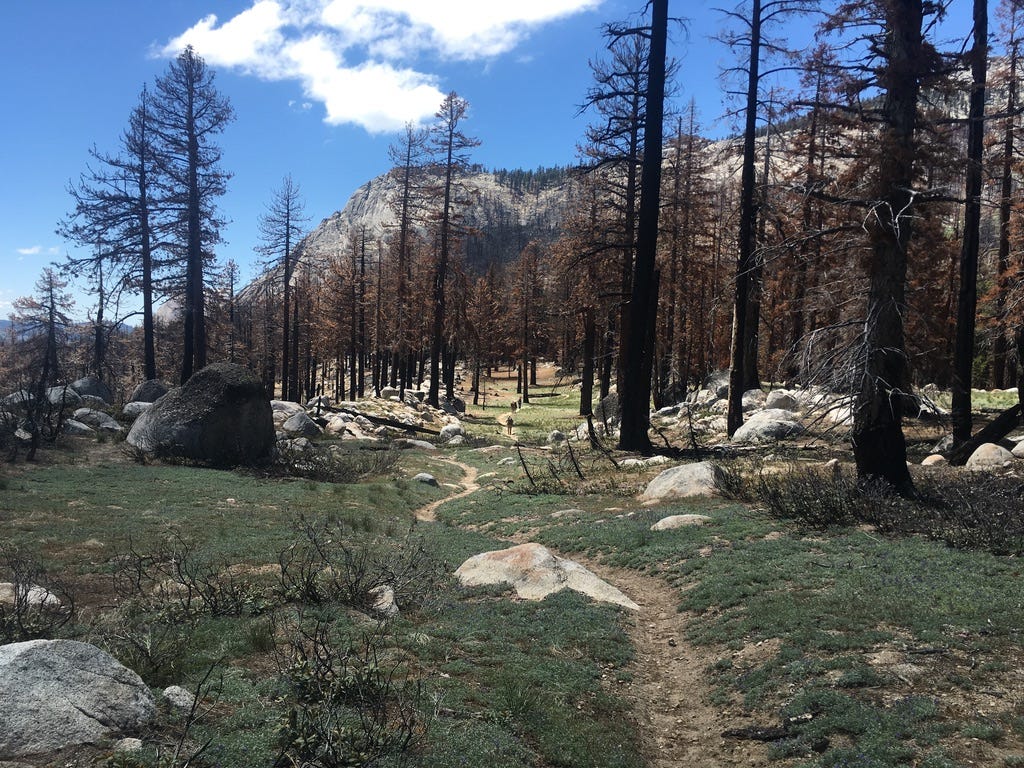There Are Moments When The Body Is As Numinous As Words
What were things named before there was any way to name them?
My senior year of high school contained a little moment that has greatly influenced the trajectory of my life.1 You rarely recognize those things as they happen, I find, but looking back it’s very obvious.
It was simply this: in a discussion about language in AP English, my teacher, Mrs. Iodice, said “There is no relationship between signifier and signified.” In other words, there is nothing inherent to a chair that necessitates that we use the letters and sounds of c h a i r to describe it. A chair is no more “chair” than it is “stól” or “sedia” or “kursi” or “椅子”. Save for what we call onomatopoeias this is true of all words. Maybe that sounds so simple—We call everything something, but we might well have called it something else—that you’d scoff at my calling it revelatory. But it was to me then, and still is now. Words are agreements, not truths inherent to the universe, though we sometimes treat them as such.2
I carried that lightbulb moment with me into the following summer, when it came time to pick a college major. Without hesitation I signed up for linguistics. I wanted to know more about the mechanics of language, the how and why of words. How they could so simply represent such a tangled and ever-changing set of ideas, how they could create so many feelings in us.
Of course the reality of college is quite different from what a seventeen-year-old imagines it to be. After two years of linguistics, a far more scientific and far less philosophical path of study than I had thought, I gave it up for English, which I had been taking for fun during all the time my linguistics classes had been making me miserable.
What had really interested me about the fundamental principles of language were not their scientific explanations, spun out in data sets and logic problems and diagrams of the alveolar ridge, but their mutability, their power, when written or spoken or sung. Put more honestly I wanted to learn to control the closest thing I knew to magic, I think.
At the core of that magic is the navigation of that relationship, or lack thereof, between signifier and signified. Luckily for me, if linguists and philosophers concern themselves with something you can bet that the poets won’t be far behind. I’m reminded of the opening lines of Robert Hass’s “Meditation at Lagunitas”:
All the new thinking is about loss. In this it resembles all the old thinking. The idea, for example, that each particular erases the luminous clarity of a general idea. That the clown- faced woodpecker probing the dead sculpted trunk of that black birch is, by his presence, some tragic falling off from a first world of undivided light. Or the other notion that, because there is in this world no one thing to which the bramble of blackberry corresponds, a word is elegy to what it signifies.
This “new thinking” as described by the poem’s speaker says that a word is elegy to what it signifies. That in naming or defining things with our constructed language we kill the original and inherent forms of those things and trap them forever within our own limited perspective of reality.3
Alicia Western, the psychiatric patient at the center of Cormac McCarthy’s recent novel Stella Maris, certainly seems to agree:
The arrival of language was like the invasion of a parasitic system. Co-opting those areas of the brain that were the least dedicated. The most susceptible to appropriation.
…The unconscious system of guidance is millions of years old, speech less than a hundred thousand. The brain had no idea any of this was coming. The unconscious must have had to do all sorts of scrambling around to accommodate a system that proved perfectly relentless. Not only it is comparable to a parasitic invasion, it’s not comparable to anything else.
I can’t say I’ve reached the same conclusions but this distance between the development of the animal brain and the advent of language is certainly worth pondering. For my part, knowing no other way to interpret the world than through language, I enjoy playing with language and imparting new associations to things. Musing on the multiple interpretations and usages of a phrase like Everything he had left. If language is a parasitic invasion it’s at least a fun one to be a part of.
In the real world the question of what things were before there was a way to call them anything is unresolvable. But the world of literature does provide some interesting versions of an answer. Since I first read them a few years ago, I’ve been quite taken with the interpretation given by Ursula Le Guin’s Earthsea novels. In that world the foundation of all magic is the knowledge of the “true names” of things (as opposed to their “use names”), which were imparted in the original speech of the world, a language consubstantial with its physical materials.
All power is one in source and end, I think. Years and distances, stars and candles, water and wind and wizardry, the craft in a man’s hand and the wisdom in a tree’s root: they all arise together. My name, and yours, and the true name of the sun, or a spring of water, or an unborn child, all are syllables of the great word that is very slowly spoken by the shining of the stars. There is no other power. No other name.
But we don’t, in this world, know the “true name” of anything, at least in the way it’s defined in Earthsea. So if the question and the answer are both as ineffable as they seem, then perhaps neither matter so much. I sympathize greatly with the speaker of Hass’s poem as he continues to unpack the “new thinking”, and ultimately seems to reject it:
After a while I understood that, talking this way, everything dissolves: justice, pine, hair, woman, you and I.
What the speaker returns to instead is the magic of words, and their entanglement with the very stuff of our lives and our memories:
There are moments when the body is as numinous as words, days that are the good flesh continuing. Such tenderness, those afternoons and evenings, saying blackberry, blackberry, blackberry.
At the end of the day all I really know about all this is that I love words, be they written or spoken or sung. And because of that love of words I worry a great deal about things like AI and Chat GPT, and how we’re being subjected to these artificial forms of stringing them together to create meaning, or something like it. I don’t worry that these systems are going to become so accurate and efficient that they will replace human speech or poetry or whatever, but I do worry about what they are going to do to make worse our general ability to communicate with each other. Communication between people requires not just common words but common reference points and common assumptions. Trust, in other words. And in an era where almost all communication is mediated through online platforms, our trust in each other—and therefore our interest in each other, and then our ability to feel anything like solidarity toward each other—is going to erode at the same speed as we are forced to accept the normalization of chatbots and predictive text engines as a legitimate medium for corporations and governments to engage with us.
Or maybe not! But I’m not willing to accept the risk. The risk that in the future the beautiful, ineffable magic of words will be replaced by something that claims to “solve” what is not a problem. The risk that future generations will not know that either bodies or words were ever numinous. The risk that future generations will never know the tenderness of those afternoons and evenings saying blackberry, blackberry, blackberry.
Thanks, as always, for reading. I’ll talk to you next week.
-Chuck
PS - If you liked what you read here, why not subscribe and get this newsletter delivered to your inbox each week? It’s free and always will be, although there is a voluntary paid subscription option if you’d like to support Tabs Open that way.
Besides asking out the girl who I eventually married, I mean.
See the ever-changing language norms surrounding gender and race, for example, which are protested by reactionaries on the (easily disprovable) grounds that such categories are both static and essential.
And it is limited, make no mistake. You watch those David Attenborough documentaries and you catch yourself assuming that all those animals that can see UV light, or see a different part of the color spectrum entirely, or echolocate, or navigate magnetically, are some aberrant category of beings who are making up for not being able to do things the way we do them. But our (probably) being the only species that understands that other species engage with the world differently than we do hasn’t on the whole made us more appreciative of other intelligences, but less, as we default to comparing them to our own with this sort of “deficit thinking.”





wonderful read. reminds me of this letter from The Point's archives: https://thepointmag.com/letter/on-language-games/
This gives new meaning to “I have no Words.” Another thought provoking read. Thank you.